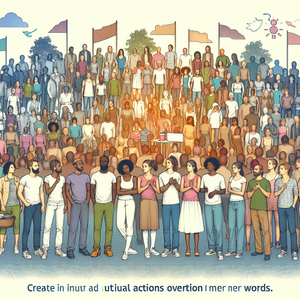The Rise of Career Collectives: Building Community in the Workplace

Career collectives represent a fundamental shift from conventional career trajectories, which typically emphasize individual achievement and linear progression. In stark contrast, career collectives are built upon the principles of collaboration and community. Members leverage their diverse skills and experiences, cultivating an environment where mutual support flourishes. This model encourages individuals to explore their passions, take risks, and innovate, all without the paralyzing fear of failure that often accompanies solitary endeavors. For instance, consider a group of freelance writers and content creators who form a collective. They share client leads, brainstorm ideas, and provide constructive feedback on each other’s work. This collaborative framework not only strengthens their individual capabilities but also enhances their collective marketability, allowing them to present a diverse portfolio of skills to potential clients.
Supporting Each Other: A New Way to Network
Networking has long been a cornerstone of career development, but career collectives are revolutionizing this concept. Rather than viewing networking as a transactional process—where individuals seek to derive benefits from others—career collectives foster a culture of reciprocity. Members actively share knowledge, provide mentorship, and collaborate on projects, leading to enhanced creativity and productivity. A prime example can be found in the realm of tech startups, where a collective of software developers, designers, and marketing specialists come together to share insights and collaborate on product development. This cooperative approach not only amplifies their creative potential but also enriches the collective’s problem-solving capabilities, resulting in innovative solutions that benefit everyone involved.
Fostering a Sense of Belonging
As remote work becomes increasingly common, professionals often report feelings of isolation and disconnection from their colleagues. Career collectives effectively address this challenge by cultivating a strong sense of community. Regular meetings, brainstorming sessions, and social events enable members to build meaningful relationships, fostering camaraderie and collaboration. For instance, a collective of remote marketing professionals might hold weekly virtual catch-ups to discuss ongoing projects and share personal updates. These interactions not only enhance professional networks but also cultivate friendships, which can significantly improve job satisfaction and overall well-being.
Breaking Down Silos and Encouraging Diversity
Another considerable advantage of career collectives lies in their ability to dismantle silos within industries. By uniting professionals from diverse backgrounds and disciplines, these collectives promote innovation and creativity. A collective comprising artists, engineers, and business strategists can generate unique ideas that may never have emerged in a more homogeneous setting. Moreover, career collectives often prioritize inclusivity and representation, ensuring that diverse perspectives are valued. This inclusivity can lead to more equitable career development opportunities for underrepresented groups, as members support one another in navigating challenges and advancing their careers. For example, a career collective focused on women in tech may provide mentorship opportunities and resources to help members overcome gender-related barriers in the industry.
The Future of Career Collectives
As the workforce continues to evolve, career collectives are likely to become an integral part of the professional landscape. They present a model that emphasizes collaboration over competition, community over individualism. Organizations can significantly benefit from fostering a culture that supports the formation of career collectives, leading to increased employee engagement, higher retention rates, and enhanced innovation. Companies can play a pivotal role by providing resources such as meeting spaces, funding for collective projects, and encouragement for employees to form groups based on shared interests or skills. This approach not only benefits individual members but also enriches the overall organizational culture, leading to a more cohesive and motivated workforce.
The rise of career collectives signifies a transformative shift in how professionals approach their careers. By prioritizing community, collaboration, and inclusivity, these collectives are redefining traditional career paths and creating new opportunities for growth and development. As we look to the future, embracing this collective mindset may be essential for navigating the complexities of the modern job market, fostering a sense of belonging, and ultimately achieving professional fulfillment. In an era where the workplace is no longer confined to physical spaces, career collectives exemplify the power of connection and collaboration, ensuring that no professional journey is undertaken alone.
Community Manager for Professional Networks
Professional associations, coworking spaces, and remote work platforms
Core Responsibilities
Develop and implement community engagement strategies to foster collaboration among members.
Organize events, both virtual and in-person, to facilitate networking and knowledge sharing.
Monitor community feedback and adapt practices to improve member satisfaction and involvement.
Required Skills
Strong interpersonal and communication skills to connect with diverse professionals.
Experience with social media and online community platforms (e.g., Slack, Discord).
Ability to analyze engagement metrics and report on community growth.
Freelance Collective Coordinator
Freelance agencies, consultancy firms, and creative collectives
Core Responsibilities
Facilitate collaboration among freelance professionals to share resources and client leads.
Organize workshops and brainstorming sessions to enhance collective skills and creativity.
Manage collective projects and ensure timely delivery of collaborative work.
Required Skills
Excellent project management abilities, with a knack for coordinating multiple freelancers.
Strong networking skills to build relationships with clients and industry professionals.
Familiarity with freelance platforms and digital collaboration tools (e.g., Asana, Trello).
Diversity and Inclusion Consultant
Nonprofits, corporate consulting firms, and large organizations focusing on D&I strategies
Core Responsibilities
Assess and develop strategies to promote diversity within organizations and career collectives.
Provide training and workshops focused on inclusivity and representation in the workplace.
Collaborate with HR to implement policies that support diverse talent acquisition and retention.
Required Skills
Deep understanding of diversity and inclusion best practices and frameworks.
Strong facilitation and training skills, with experience in public speaking.
Ability to analyze data to measure the effectiveness of diversity initiatives.
Remote Team Collaboration Specialist
Tech companies, startups, and organizations embracing remote work
Core Responsibilities
Design and implement strategies to enhance collaboration among remote team members.
Facilitate virtual workshops and team-building exercises to strengthen relationships.
Provide support and training on digital tools that promote effective teamwork.
Required Skills
Proficiency in remote collaboration tools (e.g., Zoom, Microsoft Teams, Miro).
Strong understanding of team dynamics and remote work challenges.
Experience in training or coaching individuals on best practices for remote collaboration.
Career Development Coach
Career coaching firms, educational institutions, and corporate training departments
Core Responsibilities
Work with individuals to identify their career goals and develop actionable plans to achieve them.
Provide guidance on networking strategies and leveraging career collectives for professional growth.
Offer workshops and one-on-one sessions focused on skill development and job search techniques.
Required Skills
Strong coaching and mentoring abilities, with a background in human resources or career counseling.
Familiarity with labor market trends and professional development resources.
Excellent communication and motivational skills to inspire clients.


